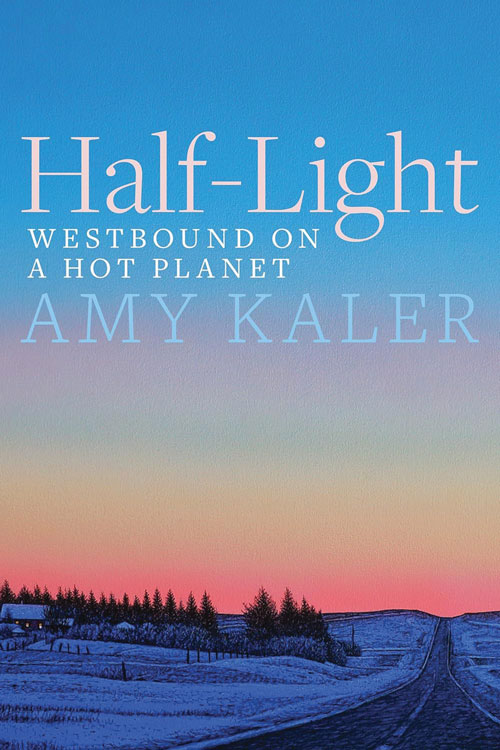Half-Light: Westbound on a Hot Planet is Amy Kaler’s collection of short essays about “going west,” both literally and metaphorically. Her exploration is part travel journalism, part memoir and part cultural criticism. “While I am geographically westbound, in a place whose past is… not mine by choice,” she writes, “I am also bound for the west in a chronological and mythical sense.”
In the prologue, Kaler tells us her book is about three things: getting older, the settler west, and living during a climate catastrophe, but these ideas never quite come together to create a unified whole. The idea of “going west” is loosely applied but not always successfully, and once in a while I found myself skimming to the next essay. In spite of this, there is much to appreciate in Kaler’s writing.
A professor of sociology at the University of Alberta, Kaler doesn’t flinch in her approach to difficult subjects. Even as people lose their homes (and lives) to wildfires, floods and hurricanes, our minds might timidly dance around the broader implications of these extreme weather events, but Kaler plunges right in: “I can’t help but think about the end times, that I might be seeing everything fall apart.” This doesn’t read as apocalyptic rhetoric. Kaler’s is a thoughtful examination of one of our greatest, often unspoken fears.
Kaler and I are of a similar age, so, at times, her writing reflects my own existential musings. The predictable unfolding of birthdays seemed relatively straightforward until I turned 50, a birthday that left me shaken. Of this phenomenon, Kaler writes, “I’m starting to see that the road ahead of me is shorter than the road I’ve travelled.” Never self-indulgent or maudlin, Kaler’s writing on aging is instead reflective and insightful.
Kaler’s academic background gives her a wealth of knowledge from which to make connections. In one of my favourite essays in the collection, she writes about COVID-19 restrictions as both “not a good way for me to live” and an opportunity for “withdrawal” and compares her isolation to the experiences of medieval anchorites Jutta von Sponheim and Hildegard of Bingen. Jutta had gone into her decades-long isolation willingly while Hildegard was confined as her companion. Jutta probably died of self-starvation, but Hildegard thrived after Jutta’s passing, becoming an abbess and writing treatises on theology, natural history and other subjects. On her good days, Kaler tells us, she could take inspiration from Hildegard, hammering her experience into her “own purpose.” On her bad days she felt more like Jutta, “prone to extremes in order to ward off an unknown future.”
Many of Kaler’s essays feature forgotten or nearly forgotten places, relics of the “settler west.” If you’ve explored the western provinces, you’ve likely seen some of these “capitalist ruins.” They are communities or mines or bridges that rose as part of the “economic apparatus of the west” and all but disappeared once they lost “financial value.” In one essay, Kaler explores Retlaw, a ghost town she describes as “a brief candle,” a “place where a town used to be for almost ten times as long as the town existed.” Over a lifetime, I’ve seen so many of these ruins that they seem commonplace. Kaler’s reflections remind me that they are a signature of our colonial past.
Half-Light: Westbound on a Hot Planet is full of astute sit-a-while-and-think-about-it observations, many of which I’ll want to come back to and reread or quote in my own writing. At her best, Kaler offers us new ways of seeing and grasping both the mundane and the terrifying.
Roberta Laurie teaches communication studies at MacEwan University and is the author of Weaving a Malawi Sunrise.
____________________________________________


